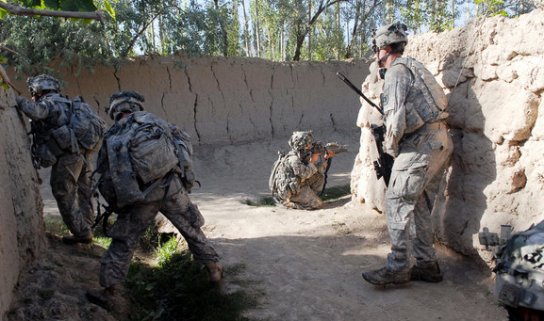« US Vice President Biden Hits Nerve In Russia | Main | President Hamid Karzai Wants New ROE for US Troops »
July 28, 2009
In Country With 3rd Brigade Combat Team, 10th Mountain Division

Relocated Army outpost draws fire from angry Taliban insurgency
LOGAR PROVINCE, Afghanistan
The attackers waited until dusk, then came at the yet-to-be fortified American outpost from three sides, armed with assault rifles and rocket-propelled grenades.
It was a surprise, the first attack on the newly established outpost near the Charkh District Center in nearly two months, said Lt. Col. Thomas Gukeisen, the squadron commander who monitored Friday’s brief, unsuccessful ambush from his base about 20 miles to the east. With the help of attack aircraft, up to 20 enemy fighters were repelled.
As soldiers from Company B, 3rd Brigade Combat Team, 10th Mountain Division out of Fort Drum, N.Y., struggle with the growing pains of setting up a post in the population hub in Charkh, they are contending with extremely primitive conditions while flushing out a rooted enemy.
"The enemy’s pissed off," Gukeisen said, noting that the attack and a roadside bomb ambush earlier in the day occurred just hours after 150 feet of perimeter security barriers known as Hescos were delivered to the district center.
“They hate the sight of Hescos. They know you are here to stay.”
Charkh — as well as Baraki Barak district to the north and Kharwar district to the south — is the battle space of the 3rd Squadron’s 71st Cavalry Regiment, which conducts surveillance and reconnaissance for the 3rd BCT. The units deployed to this region in January. Troops set up outposts in each district, getting to know the populations, the enemy and the lay of the land.
Company B of the 1st Battalion, 32nd Infantry Regiment, which is attached to the 3-71 Cav, set up in Baraki Barak, then moved to Charkh in April, building its second outpost about seven miles from the district center.
Still in the raw stages, Combat Outpost Baugess had an Internet cafe and was about to get running water.
But Baugess was removed from both enemy forces and the civilians they operate within. It quickly became apparent that for the troops to do their jobs of separating the enemy from the people, helping to shore up local government and security forces, and ultimately winning the trust of the population, the outpost was in the wrong place.
They began using an abandoned school building adjacent to the district center as a launch post for patrols. And last week, soldiers packed up their rucksacks, dragged their cots, a generator and truckloads of sandbags, and headed there for good.
“Militarily, the outpost was great, but for the counterinsurgency, we had to commute to work,” Gukeisen said. “It’s hard on soldiers to tell them to pack up their stuff and move to a new location. But it’s the right thing to do because you have to be with and among the people. You have to have a persistent presence.”
It’s a complex and painstaking mission that falls to Capt. Jason Wingert, 29. He is trying to run two outposts at once.
The building the troops are squatting in is filthy. Once again, they are living without running water or electricity. Food consists of Meals, Ready to Eat. And the concrete roof tiles allow the weather and the dust to pass right through their seams.
Coming down with a bad bout of stomach bug has become a rite of passage at Charkh DC. Conditions were so bad that Gukeisen sent in a health team last week to address the situation.
“When I made the decision to do [the move], I knew I was asking a lot of these guys,” said Wingert, of Evans Mills, N.Y. “To start over again for this company, the third time this deployment, is a lot. But from where I sit, and my boss agreed, we are not here to make ourselves comfortable. We are here to support the government and the security forces and to protect the people.”
Just south of Kabul, Logar province has long been the heart of the insurgent activity targeting Kabul.
Desert conditions and rocky mountain terrain embrace lush green valleys where fruit orchards and wheat fields feed the capital. But a scarcity of water and the terrorizing reign of the Taliban have left the villagers poor, scared and often unwilling to side with an absentee government.
Until recently, Charkh’s district sub-governor refused to come to the district center, a U.S.-funded building that was blown up three times in recent years.
Only after Company B soldiers began launching regular patrols did a newly appointed sub-governor start showing up for work, though the Americans quietly question his family ties to a known top insurgent.
“Nine months ago, the enemy could walk around the DC,” said sub-governor Ghallam Farouq Hamayoon. “If the Americans weren’t here, we couldn’t keep the district center open.
“It would be better if it were Afghan National Army and police. Right now, we need the Americans.”
The U.S. forces see it the same way. When they aren’t building the Charkh outpost, one platoon trains a ragtag Afghan police force, while others push out on patrols to Charkh’s villages, from the bazaar just down the road to remote northwestern areas, getting to know friendly faces, and often, trying to win over ambivalent or even hostile villagers.
They take their police trainees with them, hoping to show people that this is not just an American mission but one that will ultimately give them the responsive government they’ve never known. And the troops try to develop local projects such as mosque repairs or rebuilding girls schools that are frequent targets of Taliban attacks.
“I think we are making progress,” said Spc. Adam Klodzinski, 32, a 60-mm mortar gunner from Buffalo, N.Y.
“They seem more open to us, more willing to accept our support,” he said. “I think people want to help, but they still fear the Taliban.”
When they first arrived, the soldiers were met with steady firefights.
Outgunned, the insurgents changed tactics, deploying more than 30 makeshift bombs since April, especially along the main road that runs from the district center south to COP Baugess and north toward Forward Operating Base Shank, the brigade’s headquarters. Though many struck their targets, soldiers in Mine Resistant Ambush Protected vehicles have all survived.
“When we first got to the bazaar, they’d shoot at us from the rooftops. Now, we are surrounded by kids,” said 1st Lt. Scott Davis of Seattle, whose 3rd Platoon has seen the most firefights in Charkh. “People were really skeptical initially. But when you walk up, put your Darth Vader garb and your guns down, there’s a pretty impressive change in the atmospherics.”
When they do get into firefights, the troops seek out residents to explain what happened and make reparations for property damage.
“I really don’t want to shoot anyone in Sheshquela,” Davis told a homeowner after a firefight last week in that northern village. “I want to arrest these guys. If I give you a phone number, will you call so we can come and arrest them without a firefight?”
Davis and others liken the insurgency to street gangs. The Taliban use fear tactics and lure younger teenagers with flashy promises.
A 15-year-old recently arrested for burying roadside bombs said that a man, Mullah Bashir, promised him sneakers and a cell phone, Davis said.
“It’s a lot of punk kids looking for identity and a couple of charismatic leaders,” he said. “They get to be the cool kids around school with the new outfit and cell phone.
“Going around killing kids who plant IEDs for cell phones isn’t going to help anything.”
Gukeisen breaks it down this way: Divided by a river running south to north down through the district, Charkh’s west side is controlled by Los Angeles-like gangs, while east bank insurgents are more mafia-like.
On Saturday, insurgents attacked workers widening the main road, nearly capturing three of them in an apparent attempt to shake down the U.S.-paid contractor, Gukeisen said.
Charkh Police Chief Allah Mohammad Mahsovidi said despite setbacks, he’s encouraged by improving security.
“The government belongs to the civilians and they need to choose their government,” Mahsovidi said.
“The civilians don’t want the Taliban because they are cruel. They’ve been burning schools for four years. ... The Taliban burned the [Malakay High School for Girls] three times.”
In Sheshquela last week, the platoon visited both a mosque and a girls school that needed repairs.
Then gunfire erupted. Twice in the next hour, the troops exchanged fire with insurgents who they said then broke contact and fled, with the soldiers in pursuit through the fields and orchards.
As they stood guard outside the last site of exchange, two men walked gingerly up to the troops.
Davis told the men he needs their help to stop such attacks. But Haji Amir Mahmad, 45, wasn’t so sure.

Wild Thing's comment.......
Prayers for our heroes and keep them safe. These guys have so much to deal with, the enemy, CIC they are stuck with and dealing with the people that are not the Taliban but still not sure they want to help our troops or not.
Posted by Wild Thing at July 28, 2009 05:47 AM
Comments
These are brave men and women and they need ALL our support, not the 'Apologizer' and his antics / semantics leaving them with a big question in their minds. They NEED to know that 'Shoot first, ask questions later'= SURVIVAL... and that they won't go to JAIL for defending themselves!!
Posted by: pontiff alex at July 28, 2009 10:36 AM
Obama wants them to run out, expose their throats and yell 'cut here', while he hands the enemy the knife to do the job.
The nation has it's priorities fucked up!!!
Posted by: Jack at July 28, 2009 12:27 PM
All these screwed up ROE's, all the taliban need do is take a civilian along with them and we are in deep shit. Of course non of these Terrorists have uniforms. They could name any dead terrorist a civilian. This is just Bullshit.
Jack is right obama is giving them the knife.
Posted by: Mark at July 28, 2009 06:01 PM
I agree with all of you. Obama is
the biggest terrorist of all to
our troops, the most dangerous
and he leads the way being CIC.
Posted by: Wild Thing at July 29, 2009 12:30 AM
